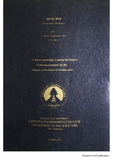Please use this identifier to cite or link to this item:
https://elibrary.khec.edu.np:8080/handle/123456789/659| Title: | MUSIC HUB (Chupinghat , Bhaktapur) |
| Authors: | UJJWAL SHAKHAKARMI 740147 |
| Issue Date: | Aug-2023 |
| College Name: | Khwopa Engineering College |
| Level: | Bachelor's Degree |
| Degree: | BE Architecture |
| Department Name: | Department of Architecture |
| Abstract: | Newa musical culture, which is often contemplated as untouched tradition that has been in practice for centuries, these days is undergoing a lot of rapid changes in content and the context mainly as a result of media, migration, and modernization.In context of Nepal, the traditional music is slowly vanishing and different form of music and musical instrument have been extinct.The music hub is an essential institutional space that plays a vital role in preserving cultural heritage and promoting artistic expression. This abstract presents an overview of the significance, objectives, and methodologies employed by such institutions to educate and inspire individuals in the realm of traditional music. This music hub is dedicated to safeguarding and transmitting age-old musical traditions from one generation to another. Through a curriculum that encompasses various forms of folk, ethnic, and indigenous music, these schools foster a deep appreciation for cultural diversity and encourage the preservation of intangible cultural heritage.The primary objectives of it include providing comprehensive music education, honing technical skills, and fostering creativity. Students are exposed to a wide array of traditional instruments, vocal techniques, and rhythmic patterns, enabling them to master their chosen art form and, in some cases, engage in crosscultural collaborations. Drawing upon established teaching methods and innovative approaches, traditional music schools create an immersive learning environment. Experienced instructors, often rooted in the traditions themselves, employ oral and aural methods alongside written notation to impart knowledge. This combination allows students to grasp the essence of traditional music, retaining its authenticity while adapting to modern pedagogical needs. In addition to formal instruction, these schools serve as community hubs, hosting performances, workshops, and cultural events. By actively engaging with the local community, they contribute to the enrichment of regional cultural identity and provide platforms for budding musicians to showcase their talents.Despite challenges posed by modernization and globalization, traditional music schools remain instrumental in safeguarding cultural expressions and nurturing a sense of belonging among individuals. As we navigate the complexities of the digital age, it is crucial to recognize and support the ongoing efforts of these institutions in preserving and revitalizing traditional music for future generations. |
| URI: | https://elibrary.khec.edu.np/handle/123456789/659 |
| Appears in Collections: | Architecture 2074 Batch Thesis |
Files in This Item:
| File | Description | Size | Format | |
|---|---|---|---|---|
| 740147_Ujjwal_Music Hub.pdf Restricted Access | 24.28 MB | Adobe PDF |  View/Open Request a copy |
Items in DSpace are protected by copyright, with all rights reserved, unless otherwise indicated.
